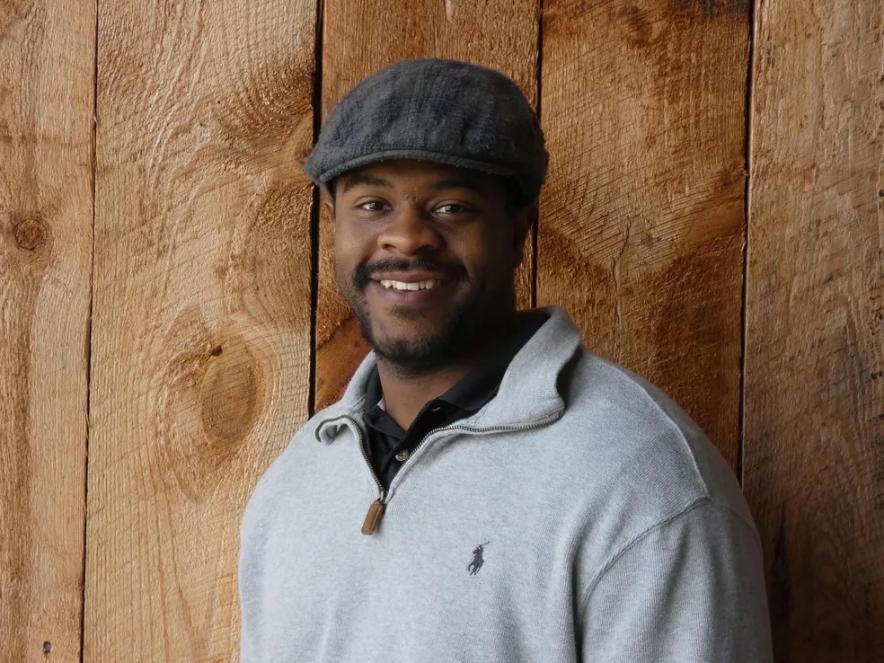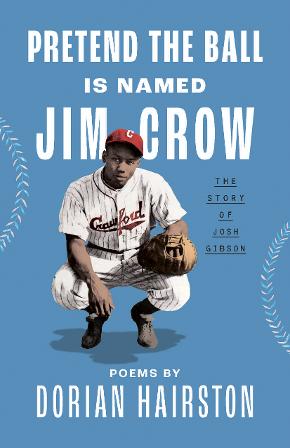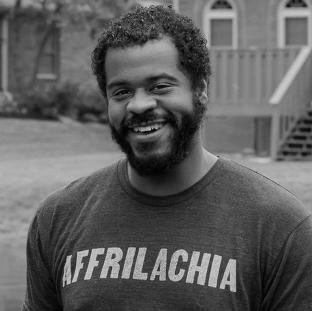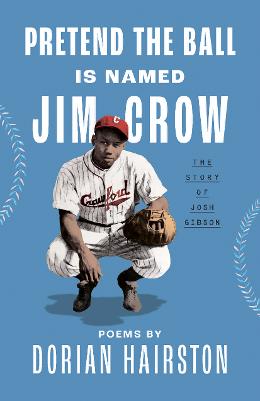Still: The Journal: Josh Gibson was married by age 18 and widowed by age 19 after his wife died giving birth to their twins. He was dead by age 35. Yet his short life was full of significant ups and downs. A hallmark of your poems is the brutal honesty of this collection, especially the things we hear from Josh Gibson and from his son Josh, Jr. Gibson wasn’t perfect, so what kind of trials did you face as the poet/researcher/storyteller in separating the mythology of Gibson from the reality of his short, turbulent life?
Dorian Hairston: I love this question! I always try to remind people that I am not setting out to present this narrative as fact or truth. Instead, it is a story designed to help us better understand grief, race, family, and most importantly love. I found myself at the beginning of this project trying desperately to separate the myth or legend from the truth. What I settled on was that they don’t necessarily have to be in conflict with one another. I can use mythos to tell truths about ourselves. Ultimately, that is all a myth is or does anyway.
However, I did want to present Josh honestly. He is, as you articulated in your question, not perfect. I wanted to make sure that I didn’t present him as flawless or above reproach. Some of these poems were hard to write, but impossible not to include. These were points where I struggled because I want my idols to be perfect, and that is never the case.
Ultimately, by the end of the book, I didn’t feel like I had to separate the Black Truth (to quote my own work) from myth. If I’m successful, my reader doesn’t care about how far the homers went. If I’m lucky, all they want to do is find someone, give them a hug, maybe even a kiss, and go catch a baseball game.
Still: In your author’s note that prefaces your book, you write: “Baseball history, much like the history of this country, is often the story of a bunch of fascinating truths that a minority tries to cover with some rather boring lies.” Can you talk a bit about that claim and how it relates to your collection?
Hairston: This is not a knock on all the great baseball players of the dynasty that was the early 20th century Yankees, but they did not have to play the best. Babe Ruth wasn’t facing Satch, Yogi Berea didn’t have to worry about Cool Papa Bell swiping bags, and Danny MacFayden wasn’t trying to strike out Josh Gibson. There comes a point in your education—if it’s a public education worth anything despite the constant attempts to cut our funding—when you realize that the story you were told, while not true, is nowhere near as cool or fascinating as the truth. For example, I was told that Jackie Robinson paved the way for Negro League Players to enter Major League Baseball because the MLB had decided it was the right thing to do. It comes as a great shock to discover that first, he was one of many folks who helped kick open doors so that later generations need not knock. Second, there were already players playing on teams (some of which were better ball players all around) and those teams existed in communities that relied on the institution of Negro League Baseball to provide opportunities for enjoyment, entertainment, employment, and significant contributions to the local economy.
Robinson openly criticized the Anthem and the treatment the nation that so proudly sings it was willing to subject him and his fellow countrymen and women to. It is great to see MLB hire and consider women for roles that hold significant decision-making power and legitimize their intellect and creativity in real opportunities to move organizations forward. However, this is yet another moment where the MLB is way too late to the game. Effa Manley’s Newark Eagle’s, which she co-owned with her husband Abe, won the Negro World Series in 1946, the year before Jackie Robinson’s debut with the Dodgers. She managed Leon Day, Larry Bobby, Monte Irvin, and Biz Mackey, all of whom are Hall of Famers and played for her on the same team—a team that beat Kansas City’s Monarchs in a 7-game series. Effa Manley was also rather vocal about her opposition to Branch Rickey’s means for integration which did not include compensating the teams that the players were being poached from. The boring part of these specific histories is that the ideas, concepts, or celebrations are presented to the public as if they are new. We have had plenty of models for what is right and what we must do to be civilized and that is what is most fascinating about history.
Still: We love the poems spoken by Hooks Tinker. His voice is compelling and memorable in the way he speaks about baseball, American history, Black history, and Josh Gibson—often mixing those themes in the same poem. Tell us a bit about who Hooks Tinker was, and can you share some insights into finding his voice for this collection? What’s your favorite Hooks Tinker poem and why?
Hairston: I know of no other way to say this, I love that you love Hooks Tinker! Tinker was a player-manager for the Crawfords and is often credited with discovering Josh. He died in 2000 when I was only six years old, so I never got the chance to meet him. However, what I love about persona poetry is that what I don’t know I get to make up. From some of the interview transcripts and reports I’ve read about Hooks, he was a wise man and often looked at integration and the destruction of Black Ball through a rather critical lens. I do the same and thus enjoy writing in his voice. The hardest question asked thus far is which Hooks Tinker poem is my favorite. If I had to pick, it’s “The Original Dodgers.” While on the surface, it is a poem overtly painful and grotesque at its core, it highlights that Black Folk are resourceful, resilient, beautiful, musical, and would much rather spend their time with freedom instead of constantly fighting for it.




